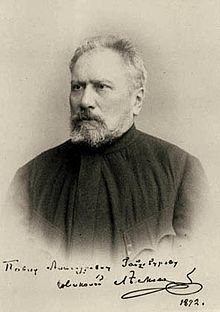Leon, the steward's son
Leon, the steward's son ( Russian Леон дворецкий сын , Leon dworezki syn ) is a story by the Russian writer Nikolai Leskow , which was published in 1881 in the anthology Jubileinaja Knischka .
The social critic Leskow denounces the embezzlement at court .
content
The Tsar's son Alexander Alexandrovich was sometimes quite inquisitive towards his father Alexander Nikolayevich . The father, who liked that, encouraged the son: "... just destroy things by all means, just do n't tell mother about it ...".
In this legend, as the subtitle shows (see below), Alexander Alexandrovich, after he has ascended the throne, uses the so-called "simple means" to put an end to a certain steward's son Leon, who as an incorrigible thief at his desk had embezzled.
Leon, whose father had been a great steward, married. His wife became the daughter of a groom and the imperial soup waitress. Leon didn't just want to please his wife; he also obeyed their godmother, Baron von Grapsch. The baron found Leon a job as a buyer. Leon charged twice as much for three-rub tea. It worked like that. He entered six rubles in the books, took six rubles from the court treasury, paid the purveyor three rubles, and kept the remainder for himself. When that worked well, Leon had to take three times this amount from the court treasury at the behest of the baroness. Soon he was making up to thirty times as much for all kinds of articles. After a while the tsar's deceiver no longer enjoyed life. Getting out was not possible. The thieves around the baron wanted to continue to earn money. Leon was afraid of this companionship and continued to cheat. Nobody could catch him anyway, because no civil servant knew the simple means mentioned above at the time.
But the new Tsar Alexander Alexandrovich used it against Leon after he had become friends with economic thinking: "How much does this fresh honeycomb cost?" He asked Leon on the street and pointed to the nearest honey seller. "Twenty-five rubles," came Leon's reply. Incredible, said the ruler. Leon had to call the peasant with the honey tray. Because the peasant was of course not a purveyor to the court and asked for two rubles, the buyer did not obey, but instead confessed his deception to the tsar.
The tsar to his entourage: "I don't need any thieves ... he [Leon] should ... be released without a letter of commendation."
German-language editions
Used edition
- Leon, the steward's son. The desk thief. From recent folk tales. German by Erich Ahrndt . P. 580–600 in Eberhard Dieckmann (Ed.): Nikolai Leskow: Collected works in individual volumes. 4. The unbaptized priest. Stories. With a comment from the editor. 728 pages. Rütten & Loening, Berlin 1984 (1st edition)
Web links
- The text
- Entry in the Laboratory of Fantastics (Russian)
